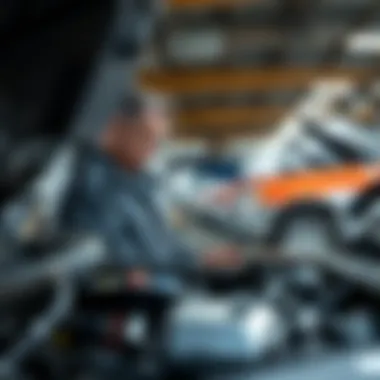Navigating the Junkyard: A Guide to Junking Your Car


Intro
Getting rid of a car is often more than just a simple decision. Life happens, and vehicles age, break down, or just don’t fit our needs anymore. The junkyard is one option that many car owners consider, but it’s essential to understand the nuances involved in this process. The decision to junk a car isn’t just about getting it off your hands; it’s about evaluating your options and potential impacts on the environment and your wallet.
In this guide, we will explore all the steps and considerations involved in the junking process, from assessing your vehicle’s condition to understanding the financial implications and ensuring you’re making an environmentally sound choice.
Not all junkyards are created equal, and the path to junking a car can navigate various twists and turns. With a better understanding of the junkyard landscape, car owners can feel empowered to make calculated choices that align with their values and objectives.
Understanding the Role of Junkyards
When the time comes to part with a vehicle that’s seen better days, junkyards step in as a valuable resource. They’re not merely places to dump old cars; they serve a greater purpose in the automotive ecosystem. Understanding the role of junkyards can help car owners realize that, sometimes, junking a vehicle is the most sensible route—not just for them, but for the environment too.
Definition and Function of a Junkyard
A junkyard, or scrapyard, is an establishment that buys and processes old vehicles. These facilities accept cars that are no longer operational, either due to mechanical failures or extensive damage. At their core, junkyards primarily focus on recycling vehicles, breaking them down into reusable parts and materials.
They play a crucial part in the end-of-life vehicle management cycle. When a car enters a junkyard, it typically undergoes a thorough sorting process. Reusable parts are salvaged for resale, and certain materials, like metals and plastics, are separated for recycling. This process not only helps recover valuable resources but also reduces waste that ends up in landfills, fulfilling an essential function in resource conservation.
Types of Vehicles Commonly Found in Junkyards
You might be surprised by the variety you can find in junkyards. It’s a bit like treasure hunting—only instead of gold, you come across a potpourri of vehicles that have filled the roads for years.
- Old Classics: From vintage Mustangs to classic VW Beetles, these cars often call junkyards home, waiting for restoration or parts.
- Accident Victims: Many cars that meet their end in junkyards are those that have been in severe collisions. Though they might be wrecked, they may still contain parts worth salvaging.
- High-Mileage Models: Cars that have simply reached the end of their life cycle due to heavy use often find their last resting place among fellow veteran vehicles.
- Non-Running Vehicles: Sometimes cars are towed in after failing to start for various reasons. These may offer valuable components to those looking to repair other vehicles.
This diverse mix allows enthusiasts and mechanics alike to find the parts they need—at a fraction of the price of new ones. It’s a place where parts become lifelines for other vehicles squeezing out a few more miles.
Why Junkyards are Important for Sustainability
In today’s world, the discussion around sustainability is more pressing than ever. Junkyards contribute significantly to this important conversation. By recycling vehicles, they help minimize the environmental impact associated with creating new parts. When a car is dismantled, materials like steel, aluminum, and even glass can be reclaimed and reused, drastically reducing the need for raw materials.
Moreover, proper disposal of older vehicles prevents hazardous materials typically found in cars—like oil, batteries, and fluids—from contaminating the environment. Therefore, reputable junkyards take steps to ensure that these substances are handled securely and according to environmental regulations.
Additionally, junkyards can also reduce the carbon footprint associated with manufacturing new parts. The energy spent on recycling is typically much less than that required to produce new components, making junkyards a pivotal player in the push toward a more sustainable automotive industry. They exemplify the complexities of resource management, showing how used items can be revitalized rather than discarded without thought.
"Junkyards are not graveyards for cars; they are recycling centers that breathe new life into what once was."
In summary, understanding what junkyards do is fundamental when contemplating the fate of an old vehicle. They serve pivotal functions in recycling, resource recovery, and contributing to environmental health—making them essential for both individual car owners and society at large.
Assessing Your Car’s Condition
Understanding the condition of your vehicle is the linchpin in the decision-making process when considering junking your car. In this pivotal section, we’ll explore the various facets of how to gauge your car's state, illuminating the benefits and what factors to behold. After all, a comprehensive assessment can save you from unnecessary heartache and financial loss down the line.
Signs Your Car is Beyond Repair
When you finally come to terms with the reality that your once-reliable vehicle is not what it used to be, it’s essential to identify the signs that it's truly beyond saving. Look for the telltale indicators:
- Severe Rust Damage: If the frame has significant rust holes, it's a signal that structural integrity could be jeopardized.
- Engine Failure: If your engine is knocking or the repairs needed far exceed its worth, it could be time to let go.
- Transmission Troubles: Slipping gears, grinding noises, or fluid leaks could mean impending doom for your vehicle.
- Electrical Issues: Persistent electrical failures often lead to costly repairs that drain your wallet.
Recognizing these signs not only affects you financially but could also keep you safe on the road. If any of these issues stand glaring at you, it may be wise to turn towards junking your car as a viable option.
Evaluating Repair Costs Versus Junking
When faced with the reality of repairs, weighing costs against the benefits of junking is crucial. Start by gathering repair estimates from trusted mechanics. Once you have these figures in hand, ask yourself:
- What’s the Total Cost? Add up parts, labor, and any hidden fees.
- What’s the Car’s Current Value? You can consult Kelley Blue Book or Edmunds to determine how much your car is worth.
- What’s Its Future Worth? If major repairs are done, will the vehicle retain value or continue to depreciate?
Let’s be real; if repair costs leapfrog the real value of your car and you’re staring at a gaping hole in your budget, junking could make more sense. Consider this line of reasoning: If coffee costs more than your favorite latte, it’s time to switch brands.
Ultimately, this analysis grants you the clarity needed to make a financially sound decision.
Understanding Depreciation and Vehicle Value
As cars age, they naturally depreciate, making it crucial to grasp how this affects your decision to junk. The value of your vehicle can drop significantly over time, and depreciation can take its toll even faster for specific makes and models. Factors at play include:
- Age of the Vehicle: Generally, cars depreciate the most in the first few years. The market value takes a nosedive, and if you've owned it for several years, it could be a hefty loss.
- Mileage: High miles often signal wear and can further decrease your vehicle’s worth in the eyes of potential buyers.
- Condition: Besides the mechanical state, cosmetic issues like dents and scratches also affect value.


Understanding these nuances can prove beneficial as you navigate your options. If depreciation hits hard and fast, junking might provide a better payout than sticking with a depreciating asset.
"When the road ahead looks bleak and your vehicle can't take another mile, assessing your car's condition is the first step towards clarity."
By gleaning insights into your car’s health, you equip yourself with the knowledge needed to make informed decisions about its future—whether that's a new chapter, or sadly, a final farewell.
Deciding to Junk Your Car
When it's time to part ways with your beloved vehicle, deciding to junk your car is a significant step that can have a lasting impact not only on your immediate life but also on the environment. The decision to junk a car isn’t just about getting rid of a rickety old heap; it’s about weighing your options, understanding the implications, and making an informed choice.
Junking a vehicle might seem daunting, yet it offers various benefits. For starters, it can relieve you of repair costs that can be more burdensome than simply letting the car go. If you find yourself pouring in cash left and right for repairs, it’s a sign that your vehicle is likely past its prime. Here’s where the first benefit of junking comes into play. You avoid the never-ending cycle of repairs, not to mention that these costs can add up faster than one might anticipate.
Moreover, junking a car contributes to a more sustainable planet. If you think about it, most of the parts in your vehicle can be recycled or reused, which means less waste sitting in landfills. Letting go of your vehicle allows skilled junkyards to orchestrate a method for recycling, keeping elements like metal, glass, and plastics in circulation rather than letting them become environmental bottles.
However, it’s crucial to pause and consider the factors involved in this decision. First, assess the current state of your car. Does it require frequent trips to the mechanic? Is it worth more as scrap than as a running vehicle? These are vital questions that you must ask yourself. Naturally, the emotional attachment to a car—the memories that cling to it—can cloud judgment, but putting practicality first often yields the best outcome.
Additionally, you need to factor in the legal aspects of junking your vehicle. State laws can be stringent when it comes to car disposal. You can’t simply relinquish the keys and walk away; there are proper procedures to follow. Not ensuring compliance can lead to fines or other repercussions.
In essence, deciding to junk your car isn’t just a matter of waving goodbye. It’s about making a choice that reflects sound financial reasoning, environmental consciousness, and adherence to legal guidelines. Understanding these elements empowers you to take the necessary steps towards the junkyard confidently and ensures that the process of parting with your vehicle is as smooth as possible.
Reasons for Junking a Vehicle
When contemplating the decision to junk your car, several reasons can tip the scales toward making this choice.
- Endless Repairs: If your car has become more of a money pit than a mode of transportation, it's time to consider junking it. When the repair bills start to outnumber the vehicle's actual value, it can be a clear indicator that it's time to part ways.
- Safety Concerns: A car that’s no longer safe to drive or doesn’t meet current emissions standards should not be on the road. If you fear for your safety or that of your passengers, seeking a junkyard option is wise.
- Environmental Impact: Older vehicles emit more pollution. If you're conscious about reducing your carbon footprint, if your car’s emissions are problematic, the choice to junk it is not only beneficial for you but for the world around.
- Space Considerations: If your driveway looks more like a junkyard than a parking space, getting rid of unused or unwanted vehicles can free up vital room.
- Financial Relief: Junking your vehicle can provide a little financial relief. Even if your vehicle is not running, junkyards often offer compensation for the metal and parts.
Legal and Regulatory Considerations
Before you haul your car to the junkyard, it’s imperative to understand the legal and regulatory landscape surrounding junking vehicles. Laws can differ vastly from state to state, so it’s vital to do your homework.
- Title Transfer: You typically need to transfer the title of the vehicle to the junkyard to legally junk it. If you don't, you remain the registered owner, potentially opening yourself up to liabilities.
- Local Regulations: Some areas may require notifying local authorities that you're junking your vehicle or even taking specific steps regarding the environmental impact. Ignoring these laws can result in fines.
- Liability Waivers: Most junkyards will have liability releases that you will need to sign. This protects you from any future issues arising from the vehicle once it has left your hands.
Overlooking these aspects can come back to haunt you, so taking the time to understand them pays off.
Documentation Needed When Junking Your Car
Before heading to the junkyard, it’s wise to gather necessary documentation to facilitate a smooth transaction. Here’s a checklist to consider:
- Title of the Vehicle: You must have the car’s title, or at least the proof of ownership, to junk it legally.
- Identification: A valid driver’s license or ID can help authenticate your ownership and identity.
- Registration Information: Keeping the registration documents handy can expedite the process.
- Any Outstanding Loans: Ensure there are no liens on the vehicle, as this could complicate proceedings.
By bringing the essential paperwork, you sidestep any unnecessary delays at the junkyard, getting your transaction wrapped up in no time.
Steps to Take Before Junking Your Car
Before you send your old car off to the junkyard, there are several critical steps to consider. Doing a bit of preparation can not only save you some headaches down the road but also ensure that you maximize any potential value from your vehicle. Taking these steps seriously can make a sizable difference in the overall experience.
Removing Personal Items from Your Vehicle
One of the first things you should do is clear out your personal belongings from the car. Cars often become storage units for various knickknacks, but it's vital to retrieve your items before the junkyard takes possession.
You might find:
- Documents: Insurance papers, registration, or any important paperwork. It’s tempting to leave these in the glove compartment, but they could easily get lost or end up in the hands of someone else.
- Valuable items: Your phone charger, sunglasses, or a spare change stash, no matter how small. Every bit counts!
- Sentimental items: That air freshener you bought during a road trip or your favorite coaster that somehow ended up on the dashboard. You never know what holds emotional value.
Make a checklist and go through each section of your car—cup holders, under the seats, the trunk—you'd be surprised by what might turn up. Everything should be removed before the vehicle leaves your possession, as that can prevent regrets later on.
Canceling Insurance and Registration
Next up on the agenda is the cancellation of your insurance policy and vehicle registration. Letting these factors linger can lead to unnecessary expenses.
- Insurance: Contact your insurance provider and inform them of your intent to junk the car. Most companies will guide you through any necessary paperwork. Do keep in mind: if you forget to cancel, you could still be charged premiums for a car that’s no longer on the road.
- Registration: Cancelling your vehicle registration with the Department of Motor Vehicles (DMV) of your state is equally essential. You'll want to avoid being liable for any future fines or taxes associated with that vehicle. Some states may require you to return the license plates. Others might offer a way to cancel online. Be sure to check your local DMV operations and ensure you're compliant.
Obtaining Quotes from Junkyards
Finally, obtaining quotes from various junkyards is a wise move. Not all junkyards operate under the same pricing strategy, so getting multiple quotes can aid in maximizing your financial return.
- Start by calling around or visiting websites of local junkyards to request pricing information. Many places will offer a rough estimate based on the vehicle's make, model, and condition.
- Don’t hesitate to negotiate. Some junkyards might be willing to offer a better deal if they see you have multiple options in hand.
- Keep in mind the weight of the vehicle and the materials it contains, as junkyards often pay per pound. If your car has a lot of metal components or usable parts, it could fetch a higher price.


"Taking the time to gather quotes not only helps you find the best deal but also provides a clearer understanding of your vehicle’s worth in the junk market."
By following these steps, you're likely setting the stage for a smooth process when junking your car. Consider each element thoughtfully; sometimes, these little details can lead to a more favorable outcome. For further guidance on local junkyards, refer to resources like Wikipedia or Reddit to see how other car owners navigated similar potholes in the road.
Getting ready to send your vehicle off into the junkyard doesn’t have to be a hassle. Taking some time to prepare can make the transition a lot smoother.
Your Options at the Junkyard
When it comes to parting ways with your vehicle, understanding your options at the junkyard can significantly influence your outcome—both financially and in terms of convenience. This section breaks down the various avenues you can take and the pros and cons of each.
Selling Parts Versus Selling the Whole Car
Choosing whether to sell individual components or to sell your entire car can feel a bit like picking between a rock and a hard place. Selling parts can be more profitable, especially if your car retained valuable components. Oftentimes, engines, transmissions, and even electronic modules still have life left in them.
By parting out the vehicle, you get to maximize your return. However, this path can be rather time-consuming. You'll need to invest time in dismantling, listing parts online, and communicating with experienced buyers or enthusiasts.
On the other hand, selling the whole car can be a smoother, quicker process. Junkyards buy entire vehicles for the metal content, without you having to get your hands dirty. It’s less hassle, and sometimes the convenience outweighs the potential financial gain.
Considerations:
- Selling parts could yield a higher return, but it requires effort.
- Selling the entire car is straightforward but may not fetch as much.
- Balancing your time with expected financial gain is crucial.
Understanding Pricing Models
Before you take a deep dive into the nitty-gritty, grasping how junkyards structure their pricing can inform your decisions. Different junkyards may operate under various pricing methodologies—some may pay by the weight of the car, while others may have rates for specific makes and models.
The price per ton of scrap metal fluctuates based on market demand, making it essential to stay informed. Sometimes, specialized vehicles (like classic or rare models) can command higher prices than merely their metal weight.
Pricing Models to Know:
- Weight-Based: Most common; pay-per-ton based on vehicle weight.
- Model-Specific: Certain brands or models may attract a premium price due to demand.
- Part Value: If you’ve sold parts before, certain components' prices can be higher than the scrap value of the car.
Negotiating with Junkyard Representatives
When it comes to negotiating with junkyard staff, preparation is key. Just because a junkyard offers you a particular amount, doesn't mean it’s set in stone. It may be possible to negotiate a better offer by doing your homework beforehand. Knowing the average scrap metal prices and the condition of your vehicle can empower you in discussions.
Approach the negotiation with an open mind but firm intentions. If your car has specific components in good condition, inform the representative and articulate your expectations based on market research.
Tips for Effective Negotiation:
- Research beforehand to understand general payouts for your car's make and model.
- Be polite but assertive in presenting your case.
- Be prepared to walk away if the offer doesn't sit right; often, you can find a more agreeable option elsewhere.
Ultimately, knowing the ins and outs of your options at the junkyard — whether it’s dismembering your car for parts, understanding pricing intricacies, or negotiating with tenacity — can yield a smoother junking experience and potentially optimize your returns.
Environmental Impact of Junking Your Car
When the time comes to junk a vehicle, one pivotal aspect that often doesn't get the spotlight it deserves is the environmental impact. It’s easy to think about the inconvenience of parting with a car, or the financial aspects involved, but the implications for Mother Earth can be profound. Junking your car isn’t just about saying goodbye; it can also be a responsible choice towards sustainability. With various elements interplaying here, understanding this impact can empower informed decision-making.
Recycling Components and Materials
First off, recycling remains a cornerstone in minimizing waste and conserving resources. When a car is junked, various components such as metal, glass, and plastic can be salvaged and recycled rather than dumped into landfills. Take steel, for example. A single car contains about 2,400 pounds of steel which can be melted down and transformed into new products. This process reduces the need for virgin materials, lesser energy consumption in manufacturing, and decreases greenhouse gas emissions.
Not only metals but even rubber from tires and other synthetic materials find a second life in various industries. Many junkyards operate with an eye to sustainability, utilizing procedures to ensure that components are handled in an eco-friendly manner. So, when you head to a junkyard, consider it a recycling center in disguise, returning valuable materials back to the loop instead of letting them gather dust in a landfill.
Hazardous Waste Considerations
What about the bad apples, though? Cars aren't just scrap metal and tires; they also contain hazardous materials. For instance, fluids like oil, transmission fluid, and antifreeze can wreak havoc if not disposed of properly. Heavy metals can leech into soil and water systems, causing health concerns for entire communities. This is where responsible junkyards play a crucial role.
Licensed junkyards must adhere to local regulations regarding hazardous waste. They have systems in place to properly drain and dispose of these contaminants to guard against any potential dangers. Before junking your car, make sure you choose a yard that follows such protocols to ensure your car’s disposal is as clean as a whistle, not adding to the pollution problem.
Contributing to Circular Economy Efforts
Lastly, junking your car contributes towards the broader concept of a circular economy. This notion encompasses minimizing waste and continuously utilizing resources. Instead of a traditional linear model, where products are made, used, and eventually thrown away, the circular economy embraces the repair, reuse, and recycling of materials.
By junking your car through responsible channels, you’re not just discarding a vehicle; you’re participating in an eco-friendly cycle that benefits society as a whole. This small act can lead to large-scale benefits—so next time you’re ready to bid adieu to your old ride, remember you’re doing more than just clearing clutter. You are actively helping keep resources in circulation and contributing to a more sustainable future.
"Every small action counts in the pursuit of sustainability. Junking your vehicle responsibly can be a boon for the environment."


Alternatives to Junking Your Car
When faced with the tough decision of what to do with a vehicle that's seen better days, many might leap to the conclusion that junking it is the only option. However, alternatives do exist that could provide a second chance for your car, and perhaps a little cash in your pocket. This section dives into these possibilities and how they can not only benefit you but also contribute meaningfully to others.
Donation Options for Non-Running Vehicles
Donating your non-running vehicle is a noble choice that often yields multiple benefits. Several charitable organizations accept vehicles, even those that are no longer operational. When you choose to donate, you’re not just clearing up space – you’re handing over the reins to a charity that can use the car for transportation or sell it for parts to support their cause.
The process typically includes:
- Choosing a charity: Research which organizations in your area accept vehicle donations. Groups like Goodwill or Habitat for Humanity often do, and they can transform a clunker into a springboard for their mission.
- Tax benefits: You can typically deduct the fair market value of the vehicle from your taxes, which offers an added incentive.
- Simple paperwork: Most charities handle the heavy lifting in terms of paperwork, getting your vehicle removed at no cost.
"Generosity isn’t just about what you give; it’s about how those gifts ripple through others’ lives."
Selling to a Scrap Dealer
If your car is beyond repair, selling it to a scrap dealer might be a viable option. Scrap dealers often pay for vehicles based on the weight and the metal content, and believe it or not, even a dilapidated vehicle can fetch a decent price due to the value of its parts and materials.
Engaging with a scrap dealer involves:
- Finding a reliable dealer: Do your homework. Look for scrap dealers with good reviews and fair prices. You can usually find them with a quick online search or by asking around.
- Gathering quotes: Contact several dealers and obtain quotes. Prices vary, so it pays to shop around!
- Finalizing the deal: If you decide to go ahead, the dealer typically takes care of towing the vehicle away, making it a hassle-free process for you.
Trade-In Options with Dealerships
While it may seem counterintuitive to trade in a vehicle that doesn't run, dealerships understand the trade-in value of parts and materials. If buying a new car is on your radar, consider this option for potentially offsetting the cost of your next vehicle.
Here's how trading in a junk car can work:
- Dealer evaluation: Many dealerships will assess your vehicle's condition. Even if it’s not functioning, some parts might be valuable.
- Negotiation: Keep in mind the value you're willing to accept and don't shy away from negotiating.
- Seamless process: Often, dealerships manage all the paperwork for you, providing a smooth transition and allowing you to drive away in a new car without the hassles of managing a junked vehicle separately.
Financial Considerations When Junking Your Car
When it comes to parting ways with your car, especially one that's seen better days, understanding the financial implications is crucial. Many car owners often overlook this facet, but once you’re at the crossroads of junking your vehicle, the financial landscape can be intricate. Not only do you want to recoup some costs, but you also need to grasp the tax considerations and potential savings against repair costs.
Understanding Payout Structures at Junkyards
Junkyards operate on a variety of payout structures. Knowing how they decide what to pay is essential for maximizing your returns. Typically, the value offered for your vehicle will depend on several factors:
- Weight of the Vehicle: Scrap metal is a trade commodity. Therefore, the heavier your vehicle, the more dollars you might pocket.
- Condition: If there’s a chance the car can be resold or if parts are in demand, your payout may rise.
- Market Fluctuations: The price of scrap metal fluctuates based on market conditions. It can vary day to day or even hour to hour.
Most junkyards will conduct an on-site assessment before making you an offer. They often provide cash on the spot, making it easier for you to move on and free up space.
Tax Implications of Junking a Vehicle
It’s not all about what you receive when junking a car; it's equally important to know how it impacts your taxes. When you junk your vehicle, you are often entitled to certain tax deductions. Here’s a breakdown of key points:
- Deducting Donation Value: If you decide to donate your car instead of junking, you might be eligible for a tax deduction based on the vehicle's value.
- Income Reporting: Any amount you earn from selling your vehicle might need to be claimed as income. If you sell your car for parts, the money received may be subject to taxation.
- Homeowners Insurance Impact: If you plan to claim any loss related to the vehicle, check with your insurance about how it may affect your policy and premiums.
It’s a good idea to consult a tax professional if you’re uncertain about how junking your vehicle will affect your tax situation.
Comparing Financial Returns from Junking vs. Repairing
When faced with a situation where your car is failing, you'll need to weigh the financial implications of junking versus repairing. Here’s a straightforward look at the considerations:
- Repair Costs: Get a detailed quote from a mechanic. If repairs exceed the car's current value, then junking may be the wisest choice.
- Time Value of Money: Consider the time and inconvenience involved in repairing and maintaining the vehicle. What’s the cost of your time?
- Future Expenses: Old cars often come with recurring costs like new tires, transmission work or potential engine replacements. If the repair costs are just a band-aid on deeper issues, it may make more financial sense to junk it instead.
"Sometimes the quickest way to profit is to let go of the past. While it feels tough, junking that clunker can often free you to invest in something better."
End: Making Informed Decisions About Vehicle Disposal
Making the right choices about junking a car is critical for both personal satisfaction and environmental responsibility. With a myriad of options available, knowing what path to take can feel overwhelming. This article has aimed to elucidate the process thoroughly so that when the time comes, you can feel equipped to navigate this journey smoothly.
Summary of Key Points Discussed
Throughout the article, we’ve examined various aspects of junking a vehicle. Here’s a recap to keep in mind:
- Understanding Junkyards: They provide essential services not only for vehicle disposal but also for salvaging parts and environmentally responsible recycling.
- Assessing Condition: It's crucial to determine if your car is truly beyond repair, weighing the costs of fixing it against the benefits of junking.
- Deciding to Junk: You need to be aware of legal requirements and necessary documentation when making this decision.
- Prepping the Car: Before sending your car to the junkyard, ensure all personal belongings are removed and consider canceling your insurance and registration.
- Financial Aspects: Understanding how payouts work at junkyards can influence your decision-making significantly.
- Exploring Alternatives: Whether it’s donating, selling for parts, or trading in, knowing your options can lead to better financial outcomes.
Final Thoughts on Junking vs. Alternatives
Ultimately, the decision to junk a car isn't just black and white. Each option has its own array of benefits and drawbacks. Junking is a straightforward choice that clears the clutter, but other avenues may provide more value or convenience. Take some time to consider your particular situation, personal priorities, and even the potential for financial gain through alternative solutions.
By weighing all these elements, you can arrive at a decision that you feel aligns best with your values and circumstances. Not only does this reflect wise financial judgment, but it can also contribute to sustainable practices in the automotive landscape. Don't rush; reevaluate and explore all your options before making that final call.















